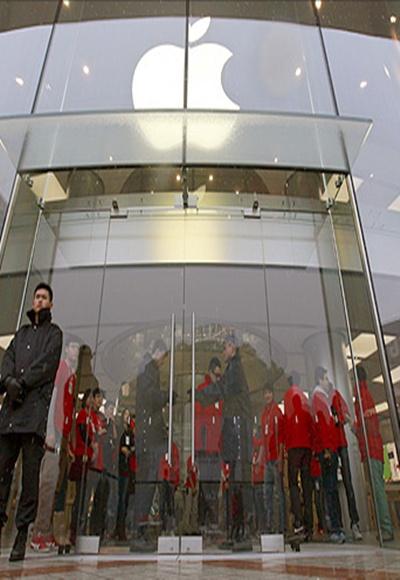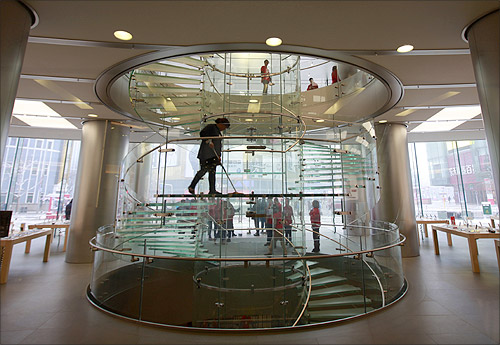Photographs: Petar Kujundzic/Reuters Tom Bergin
Apple's ability to shelter billions of dollars of income from tax has hinged on an unusual loophole in the Irish tax code that helps the country compete with other countries for investment and jobs.
A US Senate investigation revealed on Monday that Apple, maker of iPhones, iPads and Mac computers, had channeled profits into Irish-incorporated subsidiaries that had "no declared tax residency anywhere in the world".
Over the past three years, the American company paid a tax rate of 2 percent on $74 billion in overseas income, its annual reports show.
...
The Irish loophole behind Apple's low tax bill
Image: A cleaner mops a stairway at an Apple store during the release of iPhone 5 in Beijing's Wangfujing shopping district.Photographs: Petar Kujundzic/Reuters.
Apple Operations International (AOI), Apple Sales International (ASI) and Apple Operations Europe, through which much of the group's overseas income flows, are all incorporated in Ireland but are not deemed to be tax resident there, the Senate's Permanent Subcommittee on Investigations said.
Apple designated the entities as unlimited companies, which means it does not have to publish annual accounts, so the subcommittee report was the first time the structure has been publicly revealed.
Peter Vale, tax partner at accountants Grant Thornton in Dublin, said it was unusual for companies incorporated in Ireland not to be tax resident there, but legal.
...
The Irish loophole behind Apple's low tax bill
Image: A woman stands next to a giant advertisement for an iPhone in Bangkok.Photographs: Chaiwat Subprasom/Reuters.
It relies for its tax benefits on different approaches to determining tax residence in Ireland and the United States.
Vale said that if a group has at least one trading Irish subsidiary - as Apple does, in the form of units that employ 4,000 staff - it can establish a corporation that will not be deemed tax resident providing this unit's "central management control" is outside the country.
The subcommittee said AOI and ASI held board meetings in the United States and most board members were based there. That means the units would not be deemed to have Irish management control, accountants said.
...
The Irish loophole behind Apple's low tax bill
Image: A customer is helped by an Apple employee while looking over the iPad mini after the device went on sale at Apple's retail store in Palo Alto.Photographs: Robert Galbraith/Reuters.
However, the fact board meetings occurred in California did not create a U.S. tax residency because the United States determines tax residence on the place of incorporation only, said Lyn Oates, Professor of Tax and Accounting at the University of Exeter Business School.
The United Kingdom also used to allow companies to be incorporated in Britain without being tax resident here, but changed the system over 20 years ago, to stop tax avoidance, Penelope Tuck, Associate Professor of Public Finance & Policy at the University of Warwick said.
Ireland didn't change its rules, likely because there was not the same concern about the loss of tax revenues, said Professor Eamonn Walsh, Professor of Accounting at the University College Dublin's Graduate School of Business.
...
The Irish loophole behind Apple's low tax bill
Image: Apple store in New York.Photographs: Reuters.
Ireland's small population means multinationals generate relatively little by way of sales or profits there.
"From a policy point of view, people are more concerned with the idea that high-paid jobs are being delivered to the local economy," he said.
Walsh said other jurisdictions also offered similar tax advantages.
Online retailer Amazon.com Inc, for example, pays low tax rates on its overseas income by channeling European sales through a Luxembourg-based company that makes untaxed payments worth hundreds of millions of euros each year to a tax-exempt partnership, also resident in Luxembourg.
...
The Irish loophole behind Apple's low tax bill
Image: Apple iPad.Photographs: Reuters.
Web search giant Google pays low taxes by channeling overseas sales through an Irish unit that pays most of its income to an affiliate in Bermuda.
The schemes used by all three companies work by arranging for the units that make sales to customers in Europe and elsewhere to make tax-deductible payments to untaxed affiliates for the use of intellectual property such as brands and business processes.
The Group of 20 leading nations have asked the Organisation for Economic Co-operation and Development think-tank to look at corporate profit shifting, and one area it is examining closely is such payments for intangible assets.
The companies say they follow the tax rules in all the countries where they operate.
(Reporting by Tom Bergin; Editing by Will Waterman)








article